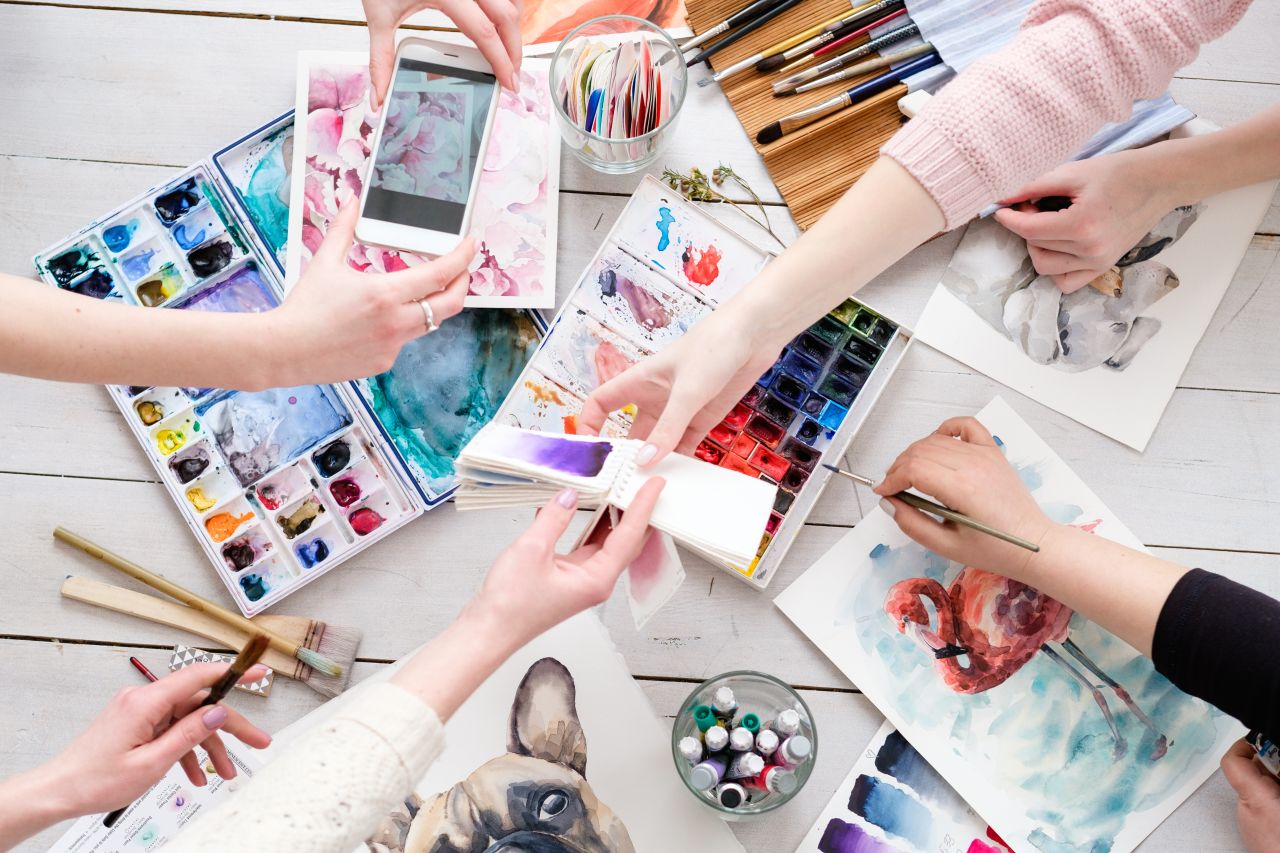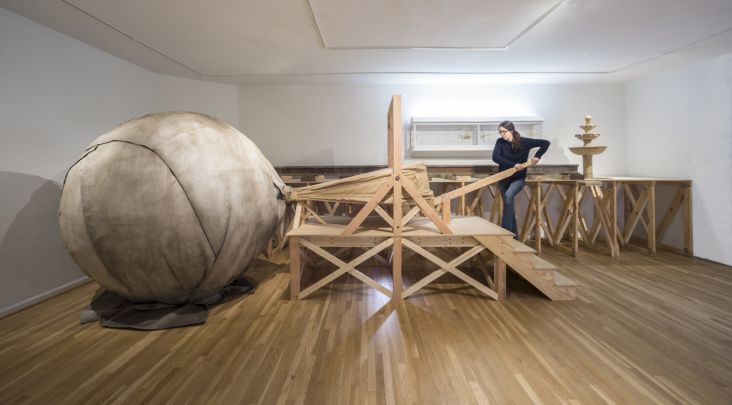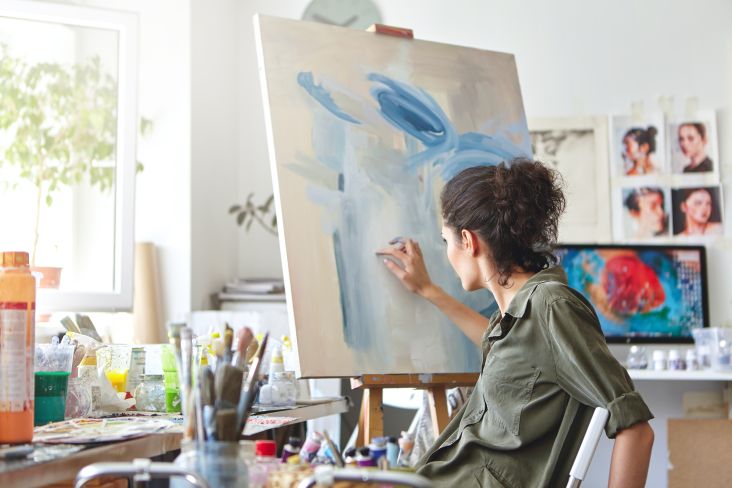Nine life-changing tips to help you make time for creativity
A creative person is buzzing in each of us. But they can't come to the phone right now, because they're buried in admin and paperwork.

Image licensed via Adobe Stock
It's something that's happened to nearly everyone at some point. We get misty-eyed at the thought of painting, playing, singing, writing or making, only to shrug it off because we haven't got time.
At the Open College of the Arts, our students come from a variety of backgrounds and lead very different lives. But they're all united by the realisation that they want to dip their toe into something more creative, whether that's illustration, photography, drawing or creative writing. They're keen to learn, and they're willing to make time to do it.
Yes, we're busy people. The world is hectic, and it seems like we've always got 100 tasks that need to be done yesterday. But there are still a few basic things that we can do to claw back some time for us, without quitting our jobs or sending our children on a remote, month-long camping expedition.
1. Choose wisely
Before you even take your first step, take a little while to think it over. What hobby or creative pursuit do you want to take on? What would make you most happy? Which would you be most likely to stick with?
A big problem with resolutions and "bucket lists" is that people often choose something that they should be interested in doing, either because it might help their career or it seems like the sort of thing a successful or interesting person would do. But if you're learning Mandarin to look cultured, or running every day because someone from Love Island is doing it, you're not going to have the drive within yourself to get over the hurdle when it gets tough.
Find something you want to do for yourself, and you'll find that you're more likely to make time to do it.
2. Don't overload
On that note, don't try to be Michelangelo overnight. Yes, it'd be great to be able to tell people that you're a painter, sculptor, actor, chef and race car driver, but if you try and hone all these skills at once, you're going to be shattered pretty quickly. Focus on the one that's most important to you, and get to grips with that before going on to others and spreading yourself too thin. Learning a new skill can be tricky, and you need to be able to give it as much attention as you can to help you make progress.
If you do have more than one thing you'd like to learn, why not make an ordered list? Then you can come back to that list to remind yourself of your plans, and maybe add exciting new ideas when they come to you.
3. Audit yourself
So you say you're too busy for hobbies? That's understandable – but is it true? Even when we feel like we're on our feet for 15 hours or more, there are at least a few times a day where we find ourselves distracted or doing something that we don't need - or want - to do.
For example, how many times a day do you get sucked into a black hole scrolling through social media, browsing eBay or wading through websites? How many meetings do you have, and what are they for?
Take a bit of time to map out what your day looks like. There are several apps and plugins out there that can help you calculate – and manage – how long you spend on specific sites online, from QualityTime to Limitless and StayFocusd.
Take a look at your diary appointments, and don't be afraid to chart your day with pen and paper. Is there nothing you can trim to pursue something important to you?
4. Don't be afraid to say no
We're always encouraged to be big fans of "yes". People who say "yes" are exciting, daring go-getters who have amazing adventures and are close personal friends of Indiana Jones and Bruce Springsteen. But it's just as important to be able to say "no".
Sometimes "yes" isn't the ticket to white-water rafting trips in South America. Often it's the word that adds 20 different meetings to your schedule, or ropes you into an event you don't want to go to. Being willing to help others is a beautiful trait, but you're also allowed to rope off some time for yourself. A polite "no" usually won't cause the social ruckus that you fear it will.
Don't be afraid to chart your day with pen and paper. Is there nothing you can trim to pursue something important to you?
5. Block out time
Some people like to work flexibly, especially when it comes to being creative. But there's a real benefit to blocking out time that's devoted to your hobby. That way, when all the tasks and demands of the world are laying siege to your day, you can firmly refuse – rather than put off your creative work by saying "you'll find time to squeeze it in later".
When you choose to put that block of time is up to you. Do you work better first thing in the morning, straight after work, or late at night? Listen to your body and find a routine that works.
6. Even if it's only 15 minutes
You don't need to retreat into a cave for a month to get better at something. Sure, immersing yourself in a craft helps, whether it's painting or learning a language. But even a few minutes devoted to your hobby will make a difference.
Former Wired founding editor Mark Frauenfelder says that he puts aside 15 minutes every day to work on a hobby, whether it's raising chickens, making sauerkraut or building guitars out of lunchboxes. While that may not seem like a lot, it can add up if you stick at it.
If you find yourself able to make a more significant commitment (say about eight to 10 hours a week), you can even invest your free time in a degree.
7. Get support
At the Open College of the Arts, students have access to one-to-one feedback from tutors and can discuss approaches and ideas with a global community of students. That can often be the difference between getting stuck in a frustrating rut and discovering a new tactic or way of thinking that gets you through the quicksand.
Learning something different can be exhilarating, but it can also be annoying and lonely. Seek out people who are at the same stage as you, and people who have been there before. Share frustrations, tips and things you've heard and seen. Don't be afraid to approach people that you respect and admire, and get advice from experts and tutors that can help you.
8. Negotiate. Consolidate. Delegate
So you've got 200 things on your plate. Do you need to be the one to do all of them? Sure, some things just can't be shifted from life's to-do list. But there are a few ways that you can make sure that they don't fall onto yours all the time. Or at least don't take up as much of your day.
Instead of dashing to the shops every other day, can you get a big shop delivered and prepare meals several days in advance? Can you pass on some responsibilities to willing family or co-workers? Failing that, would any of your friends or family take on a task for you, if you agreed to help them out with something else at a different time?
9. Weave your hobbies into your world
Visiting a new city for work? Heading on a day trip with the family? Why not take this as an opportunity to practice your hobby. Creative arts such as photography or drawing are perfect for capturing cities, landscapes and special moments, and you can take pictures without having to disrupt the day for others. Find opportunities to hone your creativity during your day, and you'll be flying before you know it.
This article was written by Paul Vincent, who has worked at the Open College of Arts since 2004 and is also studying the distance learning BA (Hons) Creative Writing degree with them. With a keen interest in scriptwriting and poetry, he also enjoys photography, surfing (when it's warm), and driving his rusty old VW campervan (when it's working).
The Open College of the Arts offers distance-learning courses in subjects such as fine art, photography, music, graphic design, creative writing, sculpture and film. It is part of the University for the Creative Arts. To find out more, go to www.oca.ac.uk.





 by Tüpokompanii](https://www.creativeboom.com/upload/articles/58/58684538770fb5b428dc1882f7a732f153500153_732.jpg)


 using <a href="https://www.ohnotype.co/fonts/obviously" target="_blank">Obviously</a> by Oh No Type Co., Art Director, Brand & Creative—Spotify](https://www.creativeboom.com/upload/articles/6e/6ed31eddc26fa563f213fc76d6993dab9231ffe4_732.jpg)









](https://www.creativeboom.com/upload/articles/b8/b80f23e91d339a21ea21225021f71fcafde53bed_732.jpg)






